Photo: Author Linda Behnken on the water off the coast of Alaska
Small-scale fisheries support a way of life that has become increasingly rare in our industrialized world—a way of life that is inexorably tied to the natural world, where individuals face forces far greater than human power and thrive only through humility and a keen awareness of natural rhythms. The humility instilled by working from a small boat on a big ocean offers humanity a path back to a way of life in balance with natural systems—a lesson industrialized countries must learn before the systems fail. Climate change, ocean acidification—these are the symptoms of a failing system. Small-scale fishermen bear witness to faltering ocean health and serve as essential storytellers for the ocean. Small-scale fishermen are uniquely positioned to alert humanity to the destruction driven by human greed and arrogance; they are also essential leaders in the immediate struggle to redefine our relationship with the world around us.
In Alaska, small-scale fisheries have been the economic engine of coastal communities for over a century. Since time immemorial, fisheries have supported Alaska’s diverse indigenous cultures. Fishing uniquely allows self-sufficient people, businesses, and communities to flourish in places where other economic opportunity is scarce. Alaskans want — and in many places, need — access to sustainable, vibrant fisheries. Once fishing access is lost, families must relocate to seek sustenance and employment elsewhere. Losing access means losing a way of life, losing strong voices for ocean health, and ultimately, losing community. Alaska, and the rest of the world, cannot afford to lose these small-scale fisheries and their contribution to a sustainable future.
When the COVID-19 pandemic hit the US, the small-scale fishermen in our organization (Alaska Longline Fishermen’s Association) quickly realized rural communities were at risk. Climate change and multiple years of exceptionally warm water in the Gulf of Alaska has stressed local salmon runs around the state, which support subsistence harvest and coastal economies. Coupled with pandemic related job loss, poor salmon returns quickly led to food insecurity. Drawing on the generosity of our fishermen, ALFA launched a seafood distribution program. We relied on locally abundant seafood to meet the need in our hometown and nearby Southeast Alaska communities, then incorporated salmon from Bristol Bay – which is experiencing record-high runs – to meet the growing need from a broader region.
With grant support from the Alaska Community Foundation and Catch Together, ALFA and our partner organization the Alaska Sustainable Fisheries Trust have to date distributed over 400,000 seafood meals to families in need in Alaska and the Pacific Northwest. This effort has resulted in not only making nutritious and culturally appropriate seafood accessible to more families, but has also forged new partnerships that will make our communities healthier and more resilient in the future.
And yet, at every level, decision makers are compromising our fisheries and a sustainable economy for non-renewable resource extraction and non-sustainable resource harvest. The proposed Pebble Mine in Bristol Bay, which threatens the greatest salmon run on the planet, has garnered international attention, but fisheries around the world are threatened by mines, logging, fish farms and, of course, climate change. Meanwhile industrial fisheries are permitted to harvest as bycatch the fish that small-scale fishermen and fishing communities depend on both culturally and economically, relentlessly undermining historic fisheries.
In Alaska, a growing coalition of small-scale, community-based fishermen are speaking out, calling for decision makers to recognize the value of coastal fisheries and to protect historic access. This group, Alaska Fishing Communities, has documented the cultural and economic value of coastal fisheries while calling attention to the role of systemic racism in resource allocations. While calling for a paradigm shift in fisheries management, the new group is also highlighting the overwhelming threat of climate change to the ocean and coastal fisheries. As the group grows in number and momentum, these small-scale fishermen become the essential force demanding a new Alaska—Alaska as a salmon state instead of an oil state, with an economy based on renewable resources harvested in balance with natural systems by coastal residents.
Our world is at a tipping point. We tip away from environmental bankruptcy only if we listen to an older and more tested wisdom. Native cultures offer that deeper wisdom, as do the small-scale fishermen whose lives have been regulated by wind, tide, and current. Perhaps the ultimate value of small-scale fisheries and fishermen is their ability to lead us back to a sustainable relationship with the ocean and planet that sustain us.


